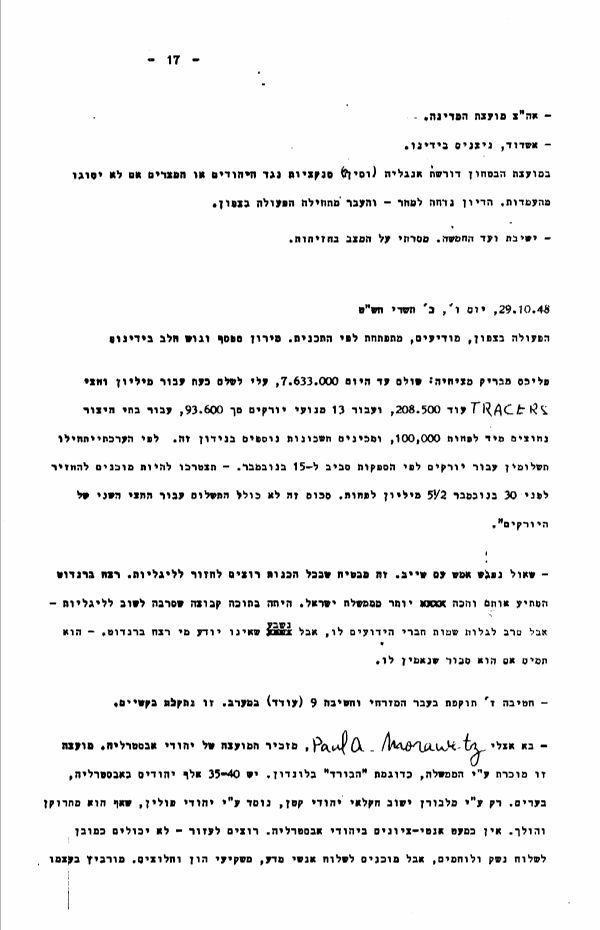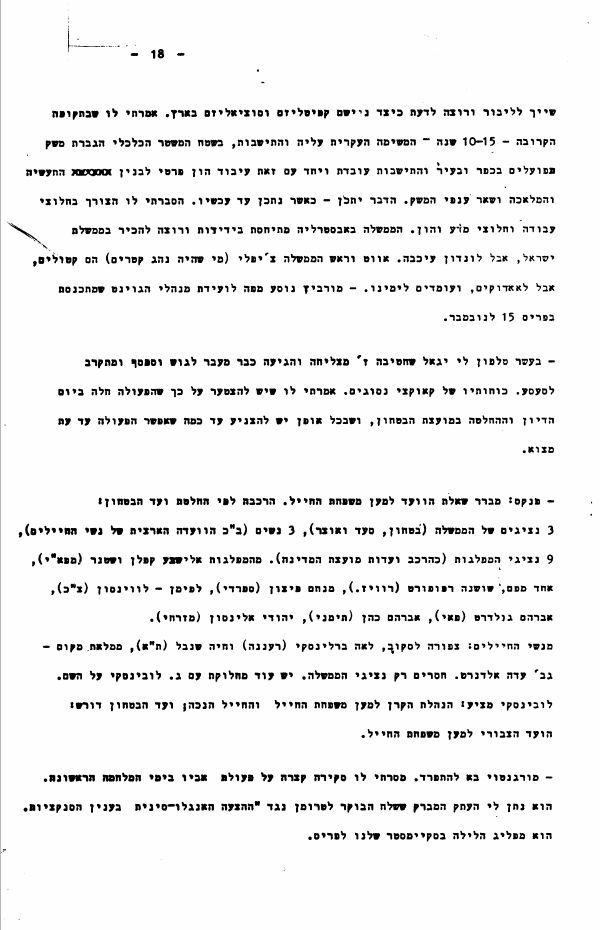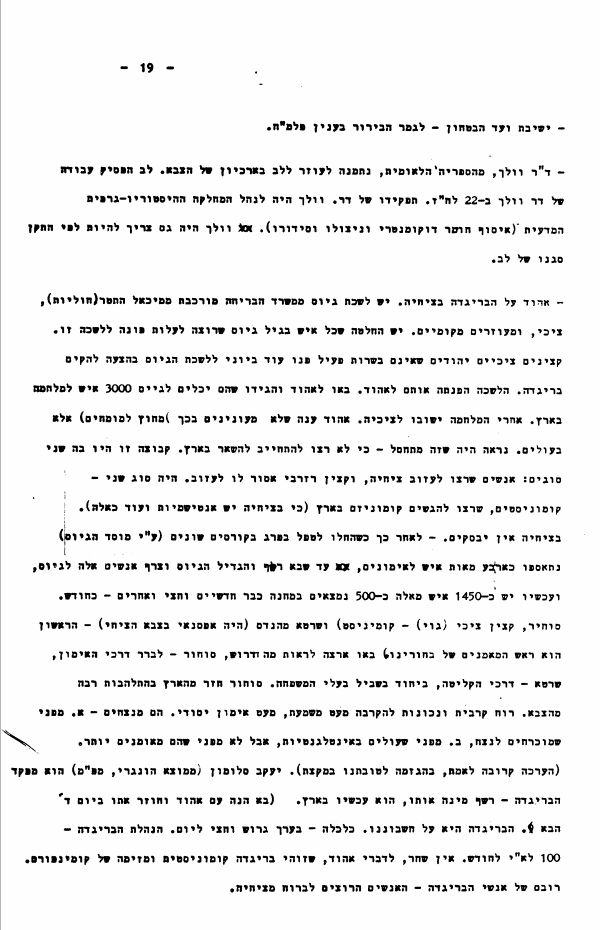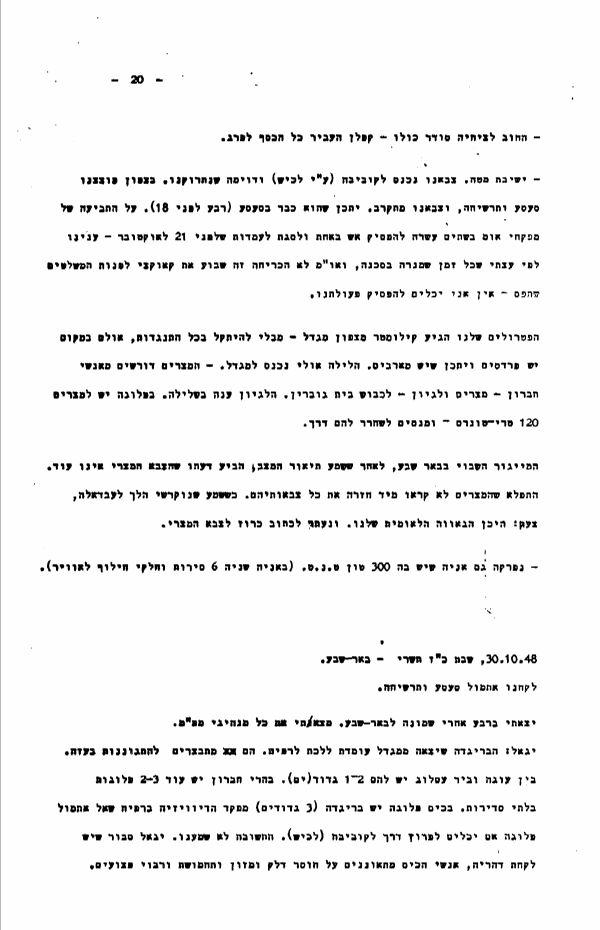1
of
Places:
Be'er Sheva
Bet Guvrin
Jish (Gush H̠alav)
Meron
London
Melbourne
Lakhish
Nah̠am
Sasa
Paris
Sa'ad
Prague
Ra'ananna
Shah̠ar
Migdal
Menara
Hebron
Egypt
Safsaf
Czechoslovakia
Ashkelon
The use of the photograph is subject to the Copyright Law, 2007
28.10.1948
225115
Friday, October 29, 1948 The action in the north, we’re informed, is proceeding according to plan. Meron, Safsaf, and Gush Halav are in our hands. – Felix [Uriel Doron] cables from Czechoslovakia: So far 7,633,000 has been paid, now I have to pay another 208,500 for 1½ million tracers [tracer bullets], and a total of 93,600 for 13 Spit [Spitfire plane] engines; at least 100,000 is needed for the factories, and additional invoices are being prepared in this regard. By my assessment payments for Spits based on what is supplied will begin around November 15. You’ll need to be ready to pay back at least 5½ million before November 30. This sum does not include payment for the second half of the Spits. – Shaul [Avigur] met yesterday with [Israel] Scheib [Eldad, of LEHI]. He promises that in all sincerity they want to return to legality [become legal again]. Bernadotte’s assassination surprised them and was a harsher blow [for them] than for the government of Israel. There was a group among them that refused to return to legality – but he refused to disclose the names the members known to him, but swore that they don’t know who assassinated Bernadotte. He’s naïve if he thinks we’ll believe him. – Brigade Zayin [7] is attacking on the eastern side [in the Eastern Galilee] and Brigade 9 (Oded) in the west. Zayin has run into obstacles. – Paul A. Morawetz, Secretary of the Council of Australian Jewry, came to see me. This council is known to the government, like the Board [of Deputies] in London. There are 35-40,000 Jews in Australia, in the cities. Only near Melbourne is there a small Jewish agricultural settlement, founded by Polish Jews, and even it is steadily emptying out. There are almost no anti-Zionists among Australia’s Jews. They want to help – of course they can’t send weapons or fighters, but they’re prepared to send scientists, capital investors, and halutzim [Zionist pioneers]. Morawetz himself belongs to the Labour [Party], and he wants to know how we’ll implement capitalism and socialism in the country. I told him that in the near term – 10-15 years – the main mission is ‘aliya and settlement, in terms of the economic system advancing the labor economy in the countryside and the city and labor-affiliated settlement [the settlement movement affiliated with the labor movement and workers’ parties], while at the same time promoting private capital for the creation of industry and trades and other branches of the economy. It is possible – as it’s been done so far. I explained the need for labor halutzim [Zionist pioneers] and science and capital halutzim. The government in Australia is friendly and wanted to recognize the government of Israel, but London held it back. [Minister for External Affairs Herbert] Evatt and Prime Minister [Joseph Benedict] Chifley (who was a locomotive engine driver) are Catholic, but not devout, and stand by us. Morawetz is going from here to the Joint [Distribution Committee] directors conference convening in Paris on November 15. – At 10 Yigael [Yadin] telephoned me [to say] that Brigade Zayin is succeeding and has already passed Jish and Safsaf and is approaching Sa’sa’. Qawuqji’s forces are retreating. I told him that it’s regrettable that the action is taking place on the day of the Security Council discussion and resolution, and that in any event it should be downplayed as much as possible until the time is right. – [David Zvi] Pinkas: looking into the question of the committee for the soldier’s family. Composition per the decision of the Defense Committee: 3 government representatives (Defense, Welfare, and Finance), 3 women (representatives from the national committee of soldiers’ wives), 9 party representatives (per the composition of the State Council committees). From the parties: Elisheva Kaplan and Shatner (Mapai), one Mapam, Shoshana Rappaport (Revis[ionists]), Menahem Pishton (Sephardim), Lipman-Levinson [sp.] (GZ [General Zionists]), Avraham Goldrat (Po’alei Agudas Israel), Avraham Cohen (Yemenites), Yehudi Elinson [sp.] (Mizrachi). From the soldiers’ wives: Tzipora Laskov, Leah Berlinsky (Ra’anana), and Haya Schnabel [sp.] (Tel Aviv), alternate – Mrs. Ada Aldenrat [sp.]. Only the government representatives are missing. There’s still a dispute with G. Lubinski [Lotan] over the name. Lubinski proposes: the Executive of the Fund for the Soldier’s Family and the Disabled Soldier; the Defense Committee insists: the Public Committee for the Soldiers’ Families. – Morgenthau came to say goodbye. I gave him a brief overview of his father’s activities during the First [World] War. He gave me a copy of the cable that he’d sent Truman this morning opposing the Anglo-Chinese proposal for sanctions. He departs [takes off] tonight on a Skymaster of ours to Paris. – Defense Committee meeting – to finish discussing the Palmach issue. – Dr. Wallach, from the National Library, was appointed assistant to [Raphael] Lev in army archives. Lev stopped Dr. Wallach’s work on October 22. Dr. Wallach’s role was to manage the scientific historiographic department (the collection of documentary material, its optimization and organization). Wallach was also supposed to be Lev’s deputy according to the job description. – Ehud [Avriel] regarding the Brigade in Czechoslovakia. There’s a recruitment center [with personnel] from the Bricha [the organization that managed the flow of Jewish refugees in Europe] office. It’s composed of Michael Hutter [sp.] ([Kibbutz] Huliot), a Czech, and local assistants. It was decided that every draft-age person who wants to immigrate should approach this center. Czech Jewish officers, who are not in active service, approached the recruitment center back in June with a suggestion to form a brigade. The center referred them to Ehud. They went to Ehud and told him that they could recruit 3,000 men for the war in the country. After the war they’ll return to Czechoslovakia. Ehud replied that [we’re] not interested in this (aside from experts), but in immigrants. It seemed that [the idea] was abandoned – because they didn’t want to commit to remaining in the country. This group had two types: people who wanted to leave Czechoslovakia, and a reserve officer is prohibited from leaving. There was a second type – communists, who wanted to actualize communism in the country (because in Czechoslovakia there’s anti-Semitism) and others like them. In Czechoslovakia there are no Yevsks [members of a yevsektsiya – a Jewish section of the Soviet Communist Party]. Later, when it was decided to have various courses in Prague (run by the recruitment center), about 400 men gathered for training, until David [Reshef] came and increased recruitment and added these people to recruitment, and now there are about 1,450 men, of whom about 500 have already been at the camp 2½ months, and others – about a month. [Major Antonin] Sochor, a Czech officer (Gentile), communist, and Shechta [sp.], an engineer who was a quartermaster in the Czech army – (the first is the chief trainer of our men) came to the country to see what’s needed: Sochor – to discuss methods of training, Shechta – methods of [immigrant] absorption, especially for those with families. Sochor returned from the country very enthusiastic about the army: fighting spirit and willingness to sacrifice, little discipline, little basic training. And they’re winning: A. because they must win, B. because they’re of higher intelligence, but not because they are better trained (an assessment that’s close to the truth, with slight exaggeration in our favor). Ya’akov Salomon (of Hungarian background, Mapam) is commander of the brigade – Reshef appointed him; he’s in the country now (came here with Ehud and goes back with him next Wednesday). The brigade is funded by us. Subsistence – about 1½ grush per day. Administration of the brigade – P£ 100 per month. There’s no truth, according to Ehud, to the claim that this is a communist brigade and a Cominform plot. Most of the brigade members are people who want to flee Czechoslovakia. The debt to Czechoslovakia has been completely settled – [Eliezer] Kaplan transferred all the money to Prague. – Staff meeting. Our army entered Qubayba (near Lakhish) and Dawayima, which had emptied out. In the north we bombed Sa’sa’ and Tarshiha, and our army is approaching. It might already be in Sa’sa’ (5:45). Regarding the UN observers’ demand at noon to cease fire at 1 [p.m.] and withdraw to the positions of before October 21 – we replied per my suggestion that as long as Manara is under threat, and for a week now the UN hasn’t forced Qawuqji to vacate the strongholds he seized – we cannot cease our activities. Our patrols reached a kilometer north of Majdal [Ashkelon] – without encountering any resistance, but there are orchards in the area and there could be ambushes. Tonight we might enter Majdal. The Egyptians are demanding that the Hebron men – Egyptians and Legion – capture Beit Jubrin. The Legion replied in the negative. The Egyptians have 120 tritoners [3-ton trucks] in Faluja – and they’re trying to clear a way for them. The major being held captive in Beersheva, after hearing a description of the situation, expressed his opinion that the Egyptian army is no more and was surprised that the Egyptians hadn’t immediately called all their forces back [to Egypt]. When he heard that Nuqrashi had gone to Abdallah he shouted: “Where’s our national pride?” and agreed to write a statement to the Egyptian army. In addition a ship with 300 tons of TNT was unloaded (a second ship contained 6 boats and spare parts for air[craft]).












